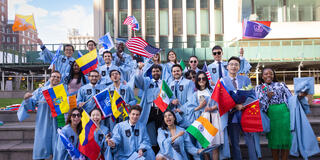What it Means to be at the World’s Most Global Public Policy School

The student body at SIPA hails from more than 100 countries, with 50 languages spoken on campus. When you come to SIPA, you will learn not only from our top faculty, but also from your classmates.
Learning from each other
Last year, two first-year students came together to organize a series of student-led talks to highlight SIPA’s global diversity. Abel Bagdy (MPA’23) from Hungary and Théophile Pouget-Abadie (MIA’23) from France were the creators of what became known as the “Tuesday Talks.”
These informal lectures usually featured one to three student speakers and some time for questions in the second half of the hour. The talks were not recorded and followed Chatham House rules, which encouraged students to speak openly and ask questions about sensitive subjects.
For most of the year, students gave talks about their countries of origin. Often, the timing of these coincided with major events happening in these countries, such as national elections or major protests.
For example, three students from Chile offered a great lecture on the state of politics in the country in the run-up to the country’s historic constitutional referendum. A few months later, Chilean president Gabriel Boric visited Columbia as part of the World Leaders Forum, and first lady Irina Karamanos held an event at SIPA.
Dialogue like the one provided by the Tuesday Talks adds invaluable context to students at SIPA. “After hearing from students, I can read about an issue in the news and feel more engaged, I feel like it actually matters,” said Théo.
Impact on students
Théo gave his talk one week before the Emmanuel Macron was re-elected as President of the French Republic. It was only when giving his own talk that he realized the lectures had a profound impact not only on those listening, but also on those speaking.
When preparing to speak about the elections in France, Théo found himself grappling with the disconnect between Macron’s broad acceptance in the United States and his deep unpopularity at home. He said that giving the talk forced him to reconcile how his country is perceived overseas, how it is perceived at home, and his own personal views.
Highlights of the year included talks regarding elections in Germany, Chile, and Hungary, country explainers on Iceland and Venezuela (the latter given by yours truly), a talk on the caste system in India, a discussion about the relationship between China and Hong Kong, and a video presentation of the military coup in Myanmar. We also had two U.S. students give deep dives on the states of Wisconsin and Texas and explain the intricacies of politics there.
If you know, you know
One thing that is remarkable about this project is that it was deeply impactful despite being totally informal. The Tuesday Talks were not held by any student organization, had no budget, and no organized leadership structure. The talks were not advertised, they spread entirely through word of mouth and managed to achieve solid attendance.
There are so many things for SIPA students to do at any given moment. The fact that so many chose to spend their Tuesday afternoons hearing their classmates share their lived experiences speaks to the value that members of the community place on each other.
In addition to our world-class faculty, we have a lot to learn from students. When asked about what motivated him to start the Tuesday Talks, Théo said: “There is no better way to learn about these subjects, places, or issues, than to hear from people who come from these places.”
Théo made sure to shout out Abel, who was the one to actually come up with the idea for the talks.